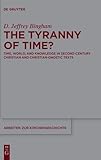The Tyranny of Time? : Time, World, and Knowledge in Second-Century Christian and Christian-Gnostic Texts / D. Jeffrey Bingham.
Material type: TextSeries: Arbeiten zur Kirchengeschichte ; 163Publisher: Berlin ; Boston : De Gruyter, [2024]Copyright date: 2025Description: 1 online resource (XII, 262 p.)Content type:
TextSeries: Arbeiten zur Kirchengeschichte ; 163Publisher: Berlin ; Boston : De Gruyter, [2024]Copyright date: 2025Description: 1 online resource (XII, 262 p.)Content type: - 9783111620312
- 9783111620602
- 9783111620527
- online - DeGruyter
- Issued also in print.
| Item type | Current library | Call number | URL | Status | Notes | Barcode | |
|---|---|---|---|---|---|---|---|
 eBook
eBook
|
Biblioteca "Angelicum" Pont. Univ. S.Tommaso d'Aquino Nuvola online | online - DeGruyter (Browse shelf(Opens below)) | Online access | Not for loan (Accesso limitato) | Accesso per gli utenti autorizzati / Access for authorized users | (dgr)9783111620527 |
Browsing Biblioteca "Angelicum" Pont. Univ. S.Tommaso d'Aquino shelves, Shelving location: Nuvola online Close shelf browser (Hides shelf browser)
Frontmatter -- Acknowledgements -- Contents -- Introduction -- Part 1. Henri-Charles Puech, Gnostic Anti-Cosmism, and Salvation History -- Chapter One. H.-Ch. Puech, His Context, His Essay, and Contemporary Interests -- Chapter Two. Responses to Puech -- Chapter Three. Salvation History and Apocalyptic Eschatology in Contemporary Valentinian and Sethian Studies -- Part 2. The Segments of Time and History in Second-Century Literature -- Chapter Four. Second-Century Christian Intellectuals: Facility for Discourse -- Chapter Five. Temporality and Eternality: A Second-Century Debate -- Chapter Six. The Segments of Time in the Second Century: Mosaic Times and Nomism -- Chapter Seven. Relating World of Temporality and Eternality: The Apocryphon of John, the Gospel of Mary, and the Valentinians -- Chapter Eight. Relating Worlds of Temporality and Eternatity: Symmetry, Promise, and Fulfillment in Irenaeus -- Chapter Nine. Time, Knowledge, and Worship among Jews, Pagans, and Christians: Aristides, Epistle to Diogentus, and Theophilus -- Chapter Ten. Summary and Conclusion: Worlds, Times, and Epistemologies among Second-Century Christians -- Bibliography -- Index
restricted access online access with authorization star
http://purl.org/coar/access_right/c_16ec
In a day fascinated with questions of historiography and with explicating a distinctive Christian philosophy of time and history, Henri-Charles Puech’s (1950s) work on Gnosis and time found an audience. Studying four second-century texts he marked as Gnostic, he argued for the Gnostic, anti-cosmic, anti-historical pessimism about existence within the tyrannical temporal world of bondage and error. Bliss and truth were otherworldly and atemporal. This book reassesses Puech’s argument by analysis of the writings undergirding his sample and a wide array of second-century Christian and Gnostic-Christian texts that display not the Gnostic view, as if there were one, but a broader second-century theological discussion regarding time, world and knowledge manifesting a spectrum of perspectives. A review of past and present scholarly discourse that evoked discussions of Gnosticism and anti-cosmism, and informed Puech’s thesis begins the volume along with study of his own thesis. A discussion of the academy’s reception of Puech then follows. The close reading of early pertinent texts forms the heart of the work arguing for eight discernible models of history, time, and world that arose within the second-century intellectual debate.
Issued also in print.
Mode of access: Internet via World Wide Web.
In English.
Description based on online resource; title from PDF title page (publisher's Web site, viewed 20. Nov 2024)









